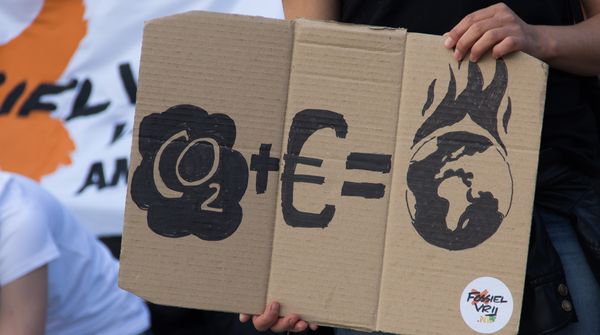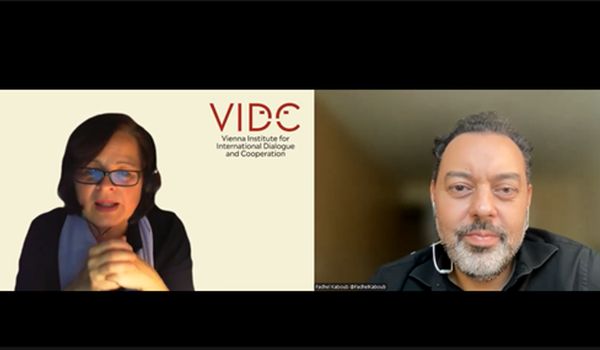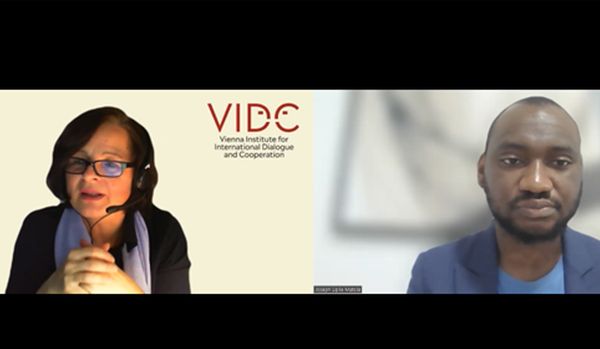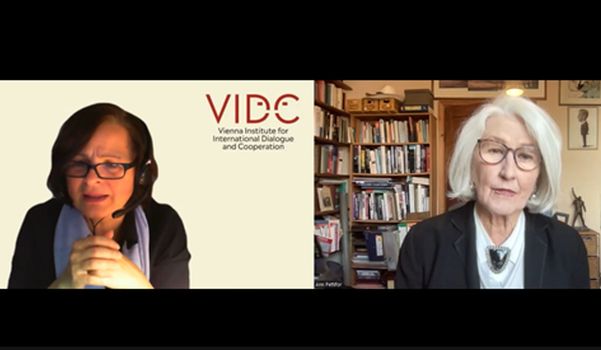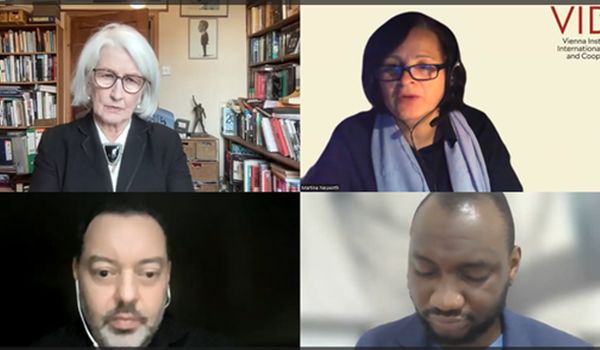The webinar discussion on 24 October 2023 centred on the role of private finance for a green and just transition in the context of a growing need for climate-related financial flows, globally and with a focus on Africa. Welcoming remarks by Martina Neuwirth (VIDC Global Dialogue) were followed by a discussion between three panellists: Joseph Upile Matola (economist at the South African Institute of International Affairs, SAIIA), Ann Pettifor (political economist, author and Fellow at the Academy of Social Sciences in London) and Fadhel Kaboub (president of the Global Institute for Sustainable Prosperity, Kenya, and Professor at Denison University, USA). .
"Private financing can and should play a bigger role, rechannelling existing capital towards green investments"
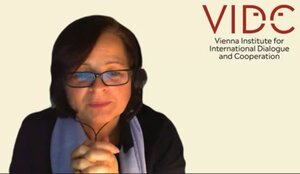
Following the introduction of the speakers and the central aims of the webinar, Martina Neuwirth asked Joseph Upile Matola to characterise the potential role of private finance in climate change adaptation and green transition, with a focus on Africa. Globally, Matola remarked, a staggering 4.3 trillion USD annually by 2030 is necessary to achieve international climate goals – a concerning figure, especially since 2021 climate finance flows were estimated at reaching only 850 billion USD. Hence, the gap between what is needed and what has been made available in terms of climate finance needs to be addressed urgently. He also underscored the global imbalance this entails, stating that African countries are among the lowest emitters, yet face the biggest effects of climate change, and thus have an increasing need for finance for adaptation. Specifically, he pointed out two key challenges in Africa in relation to climate finance, which limits the ability of African states to mobilise enough resources. Firstly, the problem to reconcile the financing needs for climate action, laid down in the Nationally Determined Contributions (NDCs), with competing social and economic needs. This became especially apparent during Covid-19, when most African countries had to reduce their climate-related allocations to address priorities caused by the pandemic.

Secondly, he discussed the unfulfilled commitments by the international community, specifically the pledge at the COP15 in Copenhagen to provide Global South countries 100 billion USD per year by 2020. Having outlined these challenges in finance mobilization by African states, he suggested that private finance can and should play a role in narrowing the climate financing gap. Specifically, he emphasized that the private sector has not been considered enough in terms of financing NDCs, as the focus has been mostly on bilateral and multilateral public financing. He stressed that domestic private capital could be leveraged. However, he noted that African pension funds have 700 billion USD in assets but that much of domestic private sector investment is currently supporting “brown” sectors, whereas this capital should be rechannelled towards green investments. Closing off, Matola suggested different tools, such as Public Private Partnerships (PPPs) and blended finance that can be utilized by states to incentivize and de-risk green private investments.
„(I)t must really be imperative for African governments to reorient their economies towards the domestic economy and to become more sustainable on their own terms“
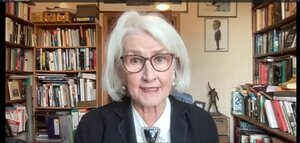
Asked for insights on the role of green private finance from a systemic point of view, Ann Pettifor took a critical stance. She pointed out the outsized role financial markets play in the governance of the economy, acting as a form of unchosen government that determines crucial economic factors such as interest rates, exchange rates, and capital flows. In this light, she called for a profound transformation of the global financial system. Pettifor considered the current structures to be serving the interests of the wealthy elites only, at the expense of the majority. Focusing on the African continent, while acknowledging the urgent need for substantial financial resources needed for adaptation and mitigation, she asserted that at a time when interest rates are rising globally, private investors will demand ever rising rates of return (ROI) on their investments. Those ROIs will have to be generated by African economies, by further exploiting Africa’s resources. Moreover, private finance actors lack the boldness required to take over the risks associated with climate-related investments. Criticizing what she perceives as a new form of capitalism, she argued that the private sector increasingly avoids bearing losses, relying on state, and thus taxpayers’, support. Consequently, Pettifor advocated that under such conditions African countries should reject climate finance from private resources. The great bias of Africa towards global capital markets has its roots in the programs of the International Monetary Fund (IMF) and the World Bank programs since the 1980s, with their focus on export orientation. This has led to economic imbalances and neglect of domestic economies. As such, rather than focusing on attracting foreign private investors, she urged African governments to reorient their economies toward domestic sustainability, particularly in anticipation of an impending global financial crisis. She stressed the importance of national currencies and economic self-sufficiency while acknowledging the value of international collaboration in other domains, such as trade and culture.
"We're talking about a financial architecture that is colonial, and it's failed us economically and ecologically"

Asked to elaborate on how the historical positioning of African countries in the global financial architecture relates to the discussions about the role of private climate finance, Fadhel Kaboub followed with a critical reflection. He emphasised how the historical development of the global financial and trade architecture is grounded in the colonial logic and fails to benefit African countries economically and ecologically. He highlighted that African countries have been placed in subordinate roles and that high external debt levels are symptoms of economies that globally only serve as sources of raw materials, dumping grounds for industrial output as well as obsolete assembly-line manufacturing and as low-cost tourism destinations. He suggested that in this context it is important to discuss climate finance in terms of climate responsibility, specifically through concepts of climate debt and climate reparations. Kaboub explained that those concepts emphasize that countries, that is governments, with a history of high emissions should be held liable for the impacts of the climate crisis. He asserted that particularly governments in the Global North have the fiscal policy space to do what is necessary in their own countries, but also to repair the damage caused by climate change, and to deliver a just transition in the Global South. However, he also stressed that this doesn't mean that private finance doesn't have a role to play. But financial flows reinforcing the subordinate economic position of African countries should be rejected. Only flows that assist the transformation of existing structures, on clearly defined terms and conditions, should be allowed. Addressing the need for structural transformation in African countries and a decolonialization of the global system, he identified deficits in energy, food and manufacturing as deep-rooted issues with colonial and post-colonial origins. Fadhel Kaboub viewed external debts as a symptom rather than a cause, as structural deficiencies contribute to trade deficits, currency depreciation, and inflationary pressures. To reverse these dependencies, Kaboub proposed pan-African cooperation for strategic investments in three key areas - food sovereignty and agroecology, renewable energy sovereignty as well as high value-added industrial policies that would allow countries to move up in value chains. Kaboub also asserted, as Pettifor, that African countries’ ability to channel investments according to their priorities is closely linked to achieving a higher degree of monetary sovereignty. Giving the example of his home country Tunisia, Kaboub explained that strengthening domestic food and energy production would have positive effects on inflation, exchange rates, external debts, or Tunisia’s carbon footprint. But all hinges on the government’s capacities to regulate and stimulate, and on the country’s productive capacities. To strengthen these capacities, international cooperation might be needed.
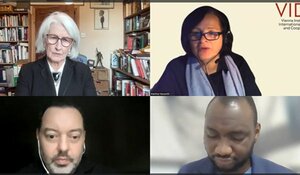
In the following discussion the speakers elaborated on the capacities of private and public finance in climate adaptation and mitigation. Matola agreed with the assertion that there are major risks related to private climate investments, given the way capitalism operates in its current form. However, he also pointed at the poor track record of African governments in mobilising funds for climate measures. He emphasised that assigning a significant role to private finance implies not only the engagement of big corporations, but also the realignment of local private finance flows with climate priorities. This alignment should be supported by clear and sound regulatory measures across the continent. Pettifor emphasised that private capital, however, has been reluctant to redirect investments from brown to green sectors, hence private finance flows are misaligned with climate goals. She referred to the ROIs in the oil industries, still aided by government subsidies, which are more generous than subsidies going to the clean energy sector. In answering a question from the audience on the opportunities related to carbon markets, Kaboub expressed scepticism, as he anticipated that the polluters would continue to emit and rather pass on the costs associated with carbon credits to their consumers, many of them in the Global South.

